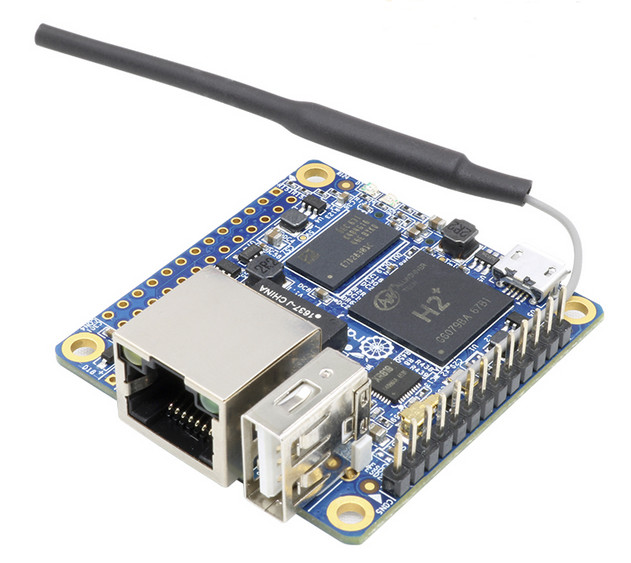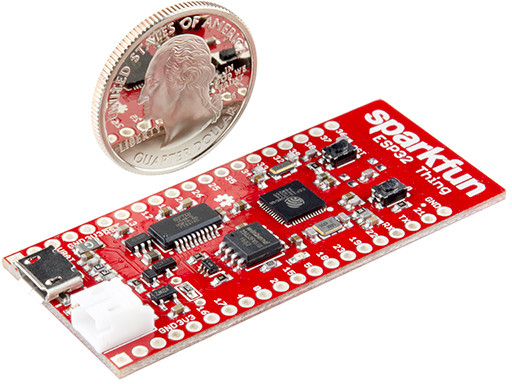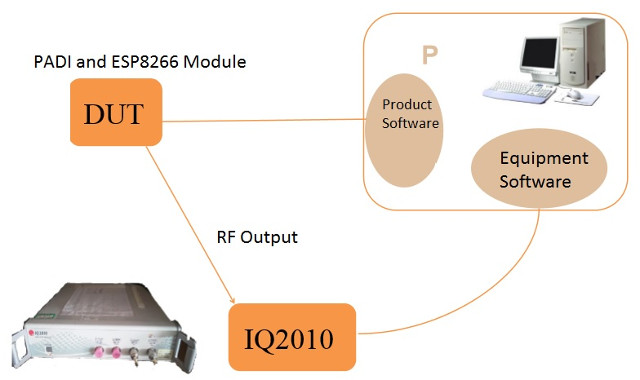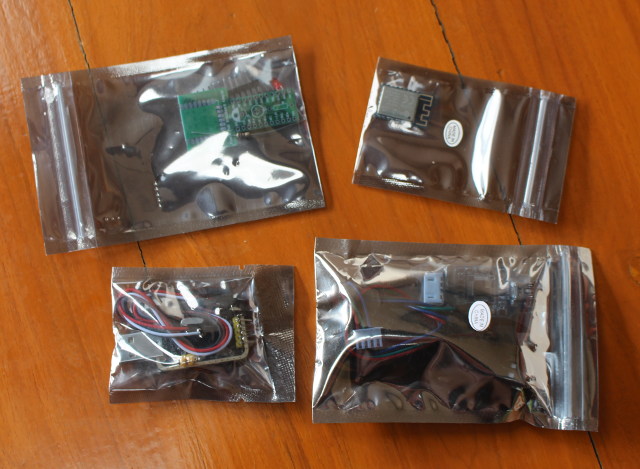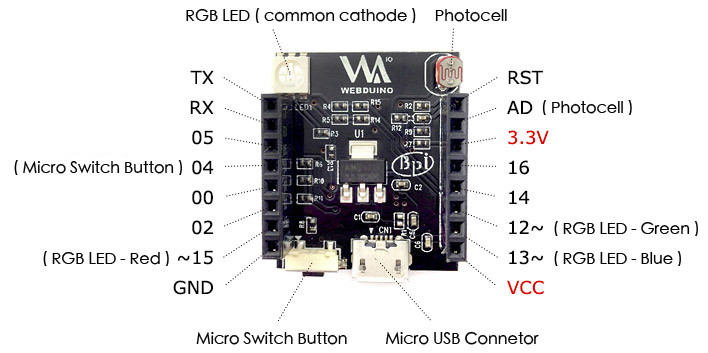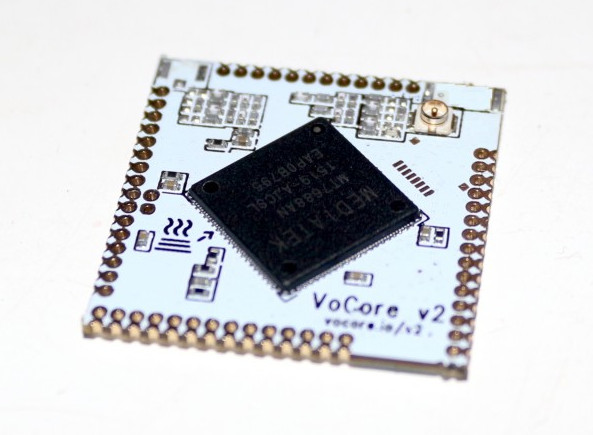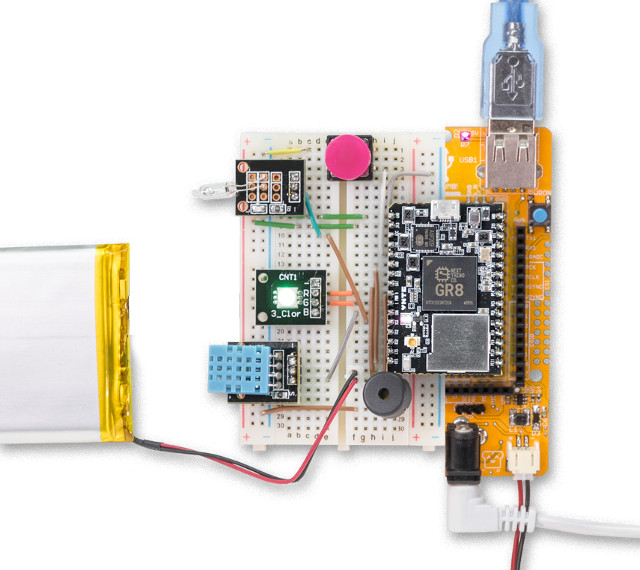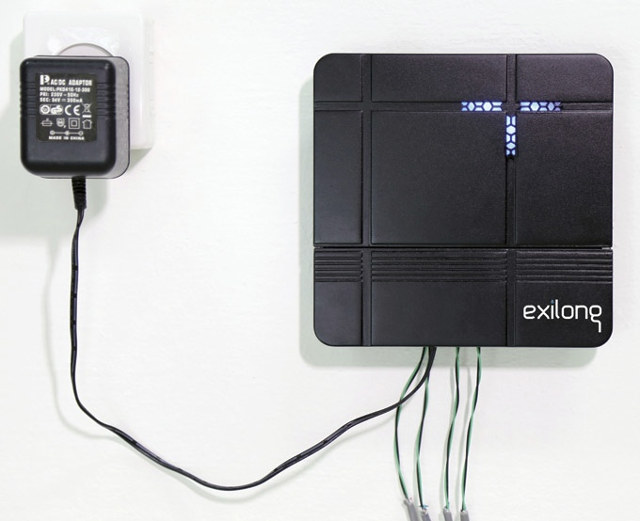Orange Pi Zero development board powered by Allwinner H2+ quad core Cortex A7 processor with 256 to 512MB RAM, Ethernet, and USB ports is now available for sale on Aliexpress for just $6.99, with shipping adding $3.39 in my case bringing the total to $10.38. Orange Pi Zero specifications: SoC – Allwinner H2(+) quad core Cortex A7 processor @ 1.2 GHz with Mali-400MP2 GPU @ 600 MHz System Memory – 256 to 512 MB DDR3-1866 SDRAM Storage – micro SD card slot Connectivity – 10/100M Ethernet + 802.11 b/g/n WiFi (Allwinner XR819 WiFi module) with u.FL antenna connector and external antenna USB – 1x USB 2.0 host ports, 1x micro USB OTG port Expansion headers – Unpopulated 26-pin “Raspberry Pi B+” header + 13-pin header with headphone, 2x USB 2.0, TV out, microphone and IR receiver signals Debugging – Unpopulated 3-pin header for serial console Misc – 2x LEDs Power […]
ESP32 Updates – ESP32-S Module Replaces ESP3212, ESP32 DevBoards for Sale, Arduino & NodeMCU Support
There have been some developments with regards to Espressif ESP32 in the last month since my post about upcoming ESP32 development boards. First ESP3212 module is no more, and has been replaced with ESP32-S module with about the same features, but it’s not pin-to-pin compatible, so the new module won’t work with older breakout boards made for ESP3212. ESP32-S is now out of stock on Seeed Studio, but you’ll find it on IC Station, Banggood, and others shops. One good news is that it’s now easier to buy – or at least pre-order – ESP32 development boards, although stock may still be an issue, as the platform is very popular. If you live in the US, you can now backorder “Sparkfun ESP32 Thing” for $19.95. ESP32 board can be powered by either a micro USB power supply or a LiPo battery, and exposes close to 30 I/O pins. ESP32 developer […]
Realtek RTL8710AF (PADI IoT Stamp) vs Espressif ESP8266 (ESP-07) WiFi RF Performance Comparison
After I posted about PADI IoT Stamp IoT kit based on RTL8710AF ARM Cortex M3 WiSoC yesterday, I was soon asked whether I could compare the RF performance against ESP8266 modules like ESP-12. I don’t have any equipment to do this kind of test, except for some simple test like testing range with WiFi Analyzer app, but I remember Pine64 told me they had some comparison data a little while, and accepted to share their results. The test setup is comprised of Litepint IQ2010 multi-communication connectivity test system and PC software, as well as the device under test (DUT) with PADI IoT Stamp (version with u.FL antenna connector) and ESP-07 ESP8266 module as a u.FL connector is required to connect the test system. They’ve tested 802.11b, 802.11g, and 802.11n, but for IoT projects 802.11b is the most important as usually long range is more important than data rate. Test results […]
Pine64 PADI IoT Stamp WiFi IoT Kit Review – Part 1: Hardware, Debuggers, and Soldering
Back in September, Pine64 unveiled their $2 PADI IoT Stamp based on Realtek RTL8710 ARM Cortex M3 WiFi SoC aiming to compete with Expressif ESP8266 solutions. The company has now sent me their complete kit for review, which beside the module itself includes a breakout board kit, and some hardware debug tools. In the first part of the review, I’ll check out the hardware, and solder the kit. I received a package with four antistatic bags. From top left to bottom right, we have PADI IoT Stamp, JLINK-OB debugger based on an STM32 MCU with some jumper wires (aka Dupont cables) for SWD signals, and a USB cable to your computer in order to flash the firmware or do some bare metal programming, a breakout board kit including two headers, a RED LED, and a resistor, and finally a USB to Serial board based on CH340G with 4 jumper wires […]
Webduino Smart ESP8266 Board is Designed to be Programmed via Websocket and Blockly Editor
Webduino Smart board reminds me of Witty ESP8266 board with its RGB LED and photocell sensor, but the design is a little different, and does not come with an extra USB to TTL board, as it’s designed to be programmed over the air using Blockly Editor. Webduino Smart specifications: WiFi Module – AI Thinker ESP-12F module with Espressif ESP8266 WiSoC Connectivity – WiFi 802.11 b/g/n 2x 8-pin headers with GPIOs, ADC (Connected to Photocell), UART, VCC, 3.3V, GND, and Reset. USB – 1x micro USB port for power Misc – Photo resistor, RGB LED, micro switch button for firmware upgrade (connected to GPIO 4) Dimensions – 3 x 2.5 cm (See comparison to AA and AAA batteries below) While Witty board was mostly targeting mainland China market with all documentation in Chinese, Webduino Smart does have some documentation in English, and is made by Banana Pi team (SinoVoIP). The default […]
Vocore2 Lite is a $4 Linux MIPS WiFi Module based on Mediatek MT7688AN SoC (Crowdfunding)
I’ve already written about Vocore v2 Crowdfunding campaign, where the second generation Vocore WiFi module supports audio, PoE, and ultimate dock, and price starting at $12. But there has been some development since the launch of the campaign, as the developer received request for a cheaper board, and after looking into it, has now added Vocore2 Lite WiFi module reward for only $4, or $7 once shipping included. He obviously had to make some trade-offs to bring the cost down, but the Lite board impressively still keep many of the same features. VoCore (2014) VoCore2 Lite (2016) VoCore2 (2016) Price 19.99 USD 3.99 USD 11.99 USD CPU RT5350, 360MHz MT7688AN MIPS24KEc @ 580MHz MT7628AN, 580MHz Memory 32MB SDRAM 64MB DDR2 128MB DDR2 Storage 16MB NOR 8MB NOR 16MB NOR Antenna Slot x1 x1 x2 On-Board ANTENNA √ × √ Wireless Speed ~75Mbps ~150Mbps ~300Mbps Ethernet Port x5 x1 / x5 […]
CHIP Pro is a $16 WiFi and Bluetooth 4.2 System-on-Module Powered by a $6 GR8 ARM Cortex A8 SIP
Next Thing CHIP board and corresponding PocketCHIP portable Linux computer have been relatively popular due to their inexpensive price for the feature set, as for $9, you’d get an Allwinner R8 ARM Cortex A8 processor, 512MB flash, 4GB NAND flash, WiFi & Bluetooth connectivity, and plenty of I/Os, which made it very attractive for IoT applications compared to other cheap boards such as Raspberry Pi Zero and Orange Pi One. The first board was mostly designed for hobbyists, but company has now designed a new lower profile system-on-module called CHIP Pro based on Next Thing GR8 SIP combining Allwinner R8 SoC with 256MB DDR3 RAM that can be used for easy integration into your own hardware project. While the original CHIP board exposed full USB ports and interface for video signal, the new CHIP Pro is specifically designed for IoT with the following specs: SIP – Allwinner R8 ARM Cortex […]
Exilong RF & WiFi Irrigation System Automatically Takes Care of Your Garden Watering (Crowdfunding)
I find it fun to spend time watering the flowers and grass in my garden, but if you’d rather do it automatically then Tevatronic Exilong might be for you as the irrigation system controls up to 4 valves, triggers watering based on RF water sensing sensors via a gateway connected to the cloud through your wireless router. The kit gateway takes care of RF communication with sensors, WiFi connectivity to the cloud server, and turn on and off up to four 24V DC water valve part of your existing installation. It can be configured by iOS or Android mobile app, or your web browser. The other part of the kit are the water pressure sensors that you need to insert into the soil of your garden in order to monitor trees, bushes, and/or flowers. The sensors are using RF (433/915 MHz) communication, send data back to the gateway every minute, […]


